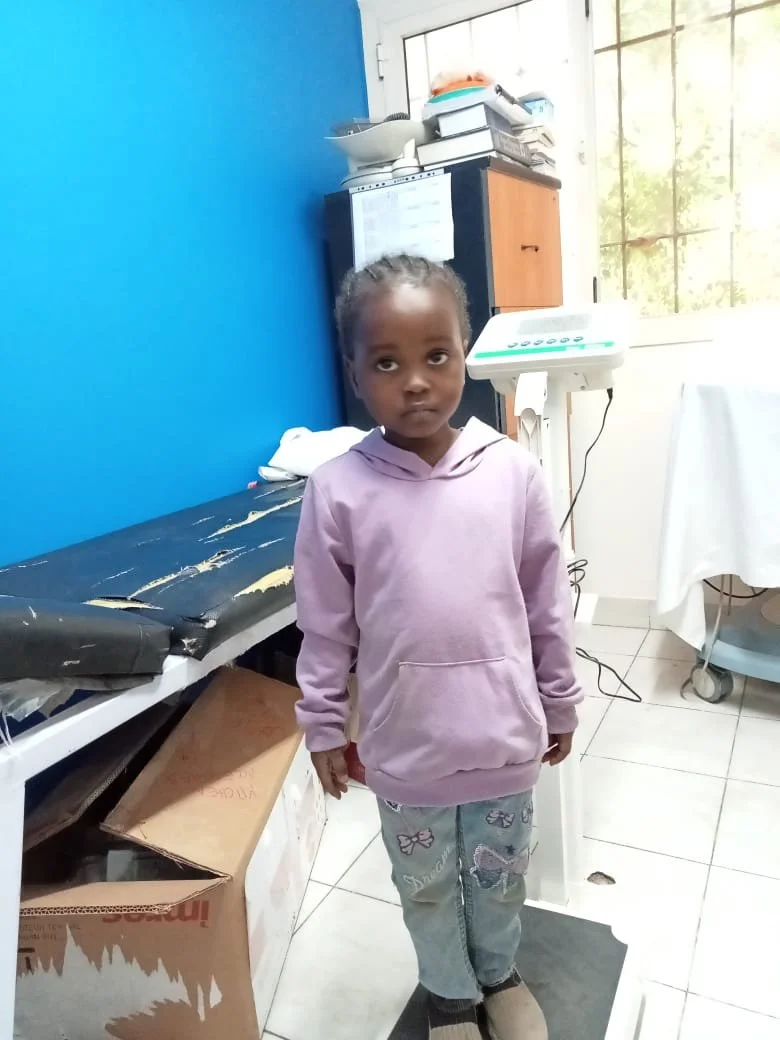Refugee Week: Serving Sudanese refugees in Egypt
June 2025
Illustration depicting a family fleeing from war and destruction. (Credit: RosZie, via Pixabay)
The war in Sudan has resulted in the displacement of nearly 13 million people. Staff at our partner, Refuge Egypt, are working tirelessly to meet the urgent and growing needs of Sudanese refugees arriving in Cairo.
Three-year-old Maryam’s life was turned upside down when she lost both of her parents in the ongoing war in Sudan. Her neighbour took her in and, seeking safety, took her on the difficult and dangerous journey to Egypt. Although they reached Cairo safely, hardship soon followed, when Maryam’s fragile health took a turn for the worse.
Maryam and her guardian are just two of the millions who have been forced to flee since the crisis in Sudan began in April 2023, when violent clashes erupted between the Sudanese Armed Forces and the paramilitary Rapid Support Forces. Since then, the conflict has continued to spiral. According to the UN, it has worsened many of Sudan’s existing challenges, such as ongoing violence, disease outbreaks, economic and political instability, and climate emergencies.
Like Maryam, many Sudanese have fled to Egypt. The government of Egypt estimates that over 1.2 million Sudanese have sought protection since April 2023 – a fivefold increase since before the war began. But it is difficult to be precise with numbers due to the high volume of unregistered asylum seekers or migrants. The UNHCR has registered just over 600,000 Sudanese as either asylum seekers or refugees, with only around 200,000 having received full refugee status.
Above: Cairo. Most people seeking refuge in Egypt live in marginalised neighbourhoods across major cities, where housing conditions are cramped and poorly ventilated. (Credit: Nassim Wahba, via Unsplash)
A recent report on refugees in Egypt by Refugees International summarises the challenges that many Sudanese people in Egypt are currently facing in its Executive Summary:
‘Government authorities are shutting down schools serving Sudanese children, hospitals often deny care, housing and other basic needs are unaffordable, and the risk of detention and deportation is a constant threat. In the last several months, Egyptian authorities have conducted raids in Sudanese neighbourhoods. Sudanese people in Cairo – both with documentation and without – fear being sent back to Sudan.’
In practice, people seeking refuge in Egypt tend to lack access to the same basic rights as their Egyptian counterparts. They live in marginalised neighbourhoods across major cities, where housing conditions are cramped and poorly ventilated. Very few are granted any form of financial assistance from the UNHCR due to the sheer numbers of refugees. Without legal access to work, many have no choice other than to work in the informal labour market for low wages, where they are prone to exploitation. Unsurprisingly, chronic health conditions and malnutrition are prevalent, especially among refugee children.
It is in this challenging context that our partner, Refuge Egypt, is serving individuals seeking refuge, guided by the principles of compassion, dignity and respect for all. One of Refuge Egypt’s hallmarks is its holistic approach that focuses on caring for the whole person: physically, spiritually, socially and emotionally.
Above: The doctors at Refuge Egypt work tirelessly to provide healthcare for the refugees that come to their clinics.
When Maryam was brought to Refuge Egypt’s paediatric clinic for under-fives in February 2024, she was suffering from a fever, persistent cough and shortness of breath. Her tiny body was weak, her face pale, and her breathing laboured. Urgent lab tests confirmed that she was gravely ill: a blood transfusion was her only hope.
Above: Maryam, attending an appointment at Refuge Egypt’s clinic.
Two weeks after the blood transfusion, Maryam returned to the clinic – and the transformation was remarkable. Her energy was returning, and her smile was brighter. To support her recovery, Refuge Egypt provided iron supplements, multivitamins and a food box to help restore her strength. She also received psychosocial support to help her heal emotionally from her traumatic experiences.
All Saints Cathedral – Refuge Egypt’s premises in Zamalek, a district in Cairo – serves as a safe haven for new arrivals. Like Maryam and her guardian, they are usually vulnerable and traumatised women and children. They are welcomed with food and drink, assessed for immediate assistance, and referred for medical or psychological support.
Refuge Egypt’s Zamalek Clinic provides antenatal and paediatric services; malnutrition, TB and HIV clinics; offers care for survivors of gender-based violence; and distributes food and hygiene bags among new antenatal care arrivals from Sudan. These services make all the difference to those who use them. After six follow-up visits to the paediatric clinic, for example, Maryam was a different child: laughing, playing and full of life once again.
This Refugee Week, please keep the Refuge Egypt staff and the people they serve in your prayers. Here are some specific prayer points:
· Pray for the staff as they work to meet the urgent and growing needs of refugees in Cairo. The scale of the need is far greater than the resources currently available to them.
· Pray for the doctors and staff who continue to serve faithfully despite receiving lower salaries than those in many other organisations. Staff retention is a growing challenge due to limited funds.
PLEASE DONATE
Your support will help the social outreach of Christians across the Middle East and will help change the lives of those facing poverty, marginalisation and exclusion.
Share this blog with your friends





